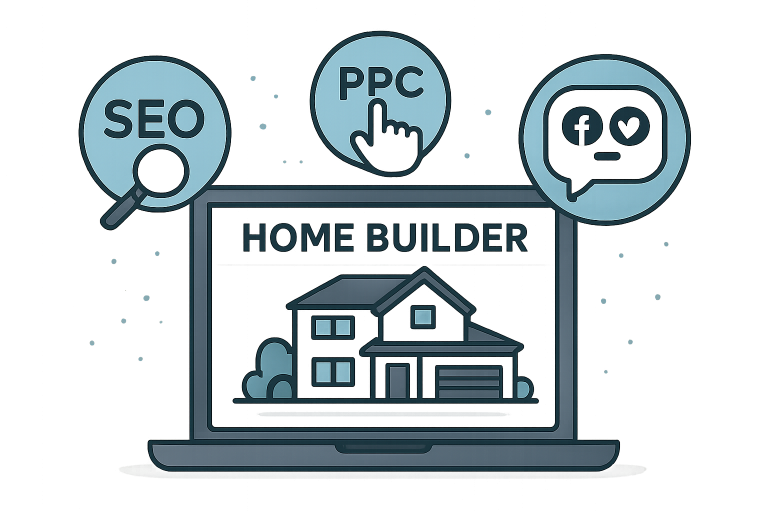To meet the expectations of today’s connected homebuyers, home builders must develop digital strategies that put them ahead in an increasingly competitive market. Whether attracting clients online or strengthening existing relationships, modern builders rely on smart marketing tactics to ensure long-term growth. Adapting to these technological trends can provide significant value; for instance, the right new home builder marketing approach links builders directly with the right buyers, using data-driven and customer-centric tactics tailored for the digital landscape.
A strong online presence goes beyond a website—it’s about storytelling, immersive experiences, and consistent communication at every stage. Digital strategies help builders stand out in a crowded industry, turning interactions into long-term relationships that drive results. Since homebuyers often start their journey online and decide before contacting a builder, enhancing your digital presence boosts credibility, leads, and conversions. Using SEO, PPC, and content marketing expands reach and engagement, keeping builders competitive. A multi-channel approach—social engagement, personalized content, and virtual experiences—sets modern home builders apart. These strategies create a brand that’s accessible and authoritative, meeting buyers’ needs and promoting long-term success.
Building an Engaging Website
For modern home builders, the website is more than a digital brochure—it’s the primary hub for your brand narrative and sales funnel. Responsive design, intuitive navigation, and high-quality visuals are vital. Featuring interactive galleries, 3D walkthroughs, and comprehensive project profiles can help visitors imagine themselves in your homes. Trust signals such as client testimonials, project timelines, and transparent pricing can also improve conversion rates and foster customer confidence.
Optimizing for Search Engines
With most homebuyers starting their search online, ranking well on search engines is essential. Focus on location-specific SEO strategies, such as creating landing pages for specific neighborhoods, optimizing for phrases like “home builders near me,” and utilizing structured data to help search engines better understand your site. Regularly updating your content with relevant keywords and ensuring technical SEO elements, such as mobile optimization and fast loading times, keeps your site ahead of the curve. According to Forbes, 68% of online experiences begin with a search engine, underscoring the importance of SEO for business growth.
Leveraging Pay-Per-Click Advertising
PPC advertising, such as Google Ads, is a powerful tool for gaining immediate visibility and attracting motivated buyers. By focusing spending on high-intent search terms—such as “custom homes near me” or “luxury new builds”—you can directly reach prospects further down the buying journey. Dynamic ad campaigns enable you to showcase various home models or promotions, while tracking and analytics provide immediate feedback, empowering you to optimize for conversions and adjust targeting as trends evolve.
Implementing Content Marketing
Content marketing remains one of the most effective ways to capture interest and convey expertise. Engaging blog posts, behind-the-scenes construction videos, FAQ sections, and how-to guides all build authority and trust with buyers. Not only do these assets support your SEO strategy, but they also nurture prospects by providing valuable insights and answers to common questions. Posts like “Energy-Efficient Home Design Trends” or “The Home Building Process Explained” can attract readers at every stage of consideration and encourage them to take the next step.
Utilizing Social Media Platforms
The visual nature of homebuilding means platforms like Instagram, Facebook, and Pinterest are indispensable channels for targeted growth. Showcasing completed projects, time-lapse construction videos, and resident testimonials fosters a sense of community and invites real-time engagement. Social platforms also offer advanced targeting tools, enabling builders to run localized ad campaigns or retarget website visitors, increasing touchpoints throughout the buying cycle.
Embracing Virtual and Augmented Reality
Virtual and augmented reality have revolutionized how buyers interact with properties. Builders can now offer interactive floor plans, virtual tours, and customization tools even before foundations are poured. These features not only reduce friction in the buying process but also appeal to remote and out-of-town buyers who can tour properties from anywhere. According to CNBC, virtual tours are quickly becoming standard practice in real estate marketing, setting new expectations for buyer engagement and decision-making.
Integrating Artificial Intelligence
Artificial intelligence offers transformative capabilities for home builder marketing. AI-powered chatbots can assist website visitors around the clock, qualify leads in real time, and provide personalized recommendations. Predictive analytics tools help identify trends in buyer preferences, optimize advertising spend, and forecast demand. These advancements not only streamline internal processes but also create a seamless and tailored experience for every prospect, resulting in higher satisfaction and improved ROI.
Conclusion
The digital landscape for home builders is evolving rapidly, placing a premium on innovative marketing approaches and agile adaptation to new technologies. By embracing these digital strategies—website optimization, SEO, targeted PPC, content marketing, social media engagement, immersive virtual experiences, and AI integration—builders can confidently meet the needs of today’s discerning buyers and secure a leading position in the market. Continuous investment in digital transformation will not only attract more clients but also build a brand recognized for excellence and innovation in modern home construction.

